A lot of addiction treatment centers call me and ask, “How do I generate more leads for my rehab?”.
Of course, I am always happy to share tactics and strategies, but you can get information like that anywhere. If you are a treatment provider calling me to ask me how to get more leads, you can also expect to have a conversation about ethics, compliance and quality work.
I am no longer shocked (but often still disgusted) at the incredibly slimy ways addiction treatment owners have grown their business by profiting from the exploitation of individuals at their most vulnerable. From patient brokering to insurance fraud, greed has consumed so many. But I am still shocked at how many new rehab owners have no clue about what is going on in their own industry. Or, worse, know and still want to take advantage of the system.
Look, patient brokering is not just morally and ethically wrong – it’s now against the law.
What Is Patient Brokering?
For those of you that don’t know, patient brokering is when an individual generates an addiction treatment lead and sells it to a rehab center or sober living home in exchange for a kickback. Often times, the person who is offering the lead brokering service is not qualified to assess an individual’s need for treatment, making it a dangerous situation for those in need of care. This person may be in a life or death situation. Instead of getting legitimate medical advice, they are tricked by some scammer willing to do whatever it takes to get that person into a rehab paying them the highest amount of money for that lead.
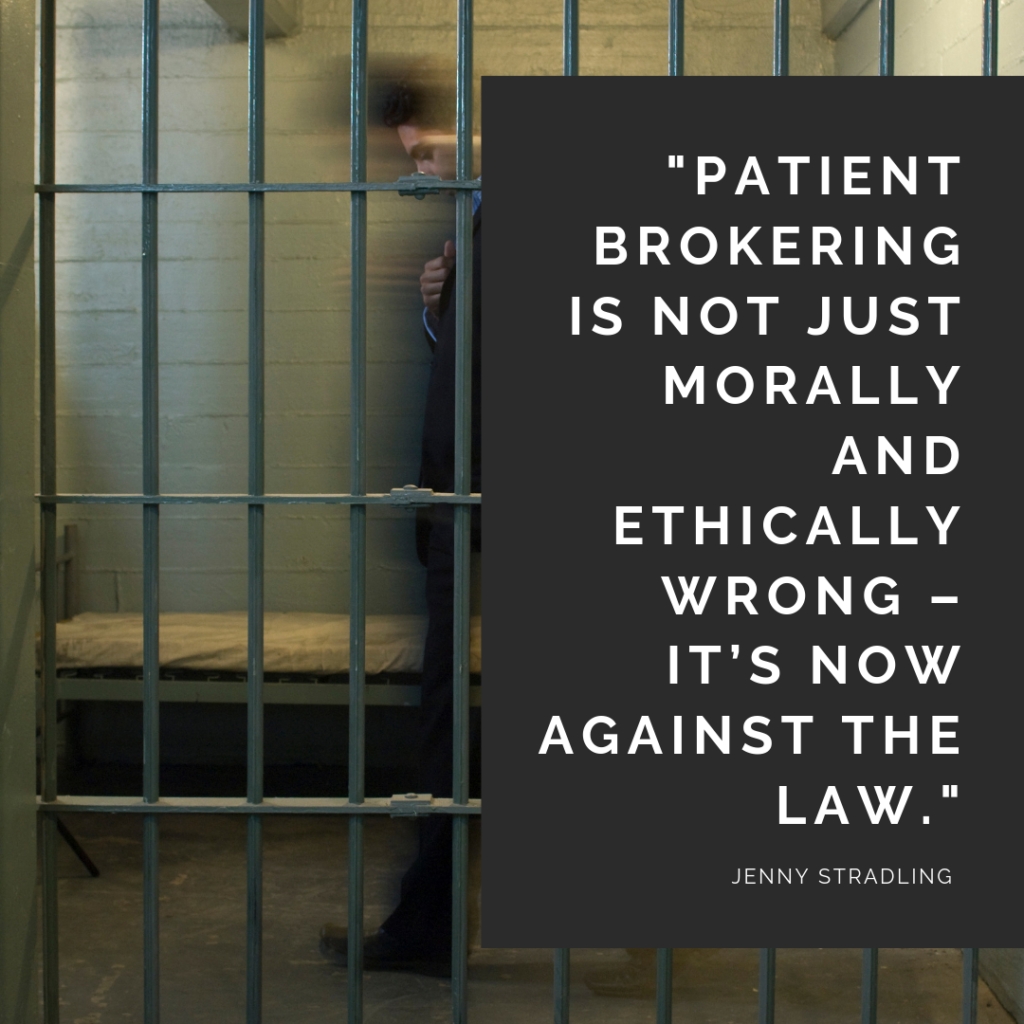
And keep in mind, we aren’t talking about a counselor, therapist, doctor or lawyer that legitimately gets patients needing a referral to treatment anyways. No. We are talking about Joe Schmo, just your regular bro, who is literally out there trolling the streets for these people. Showing up at drug court and meeting places they know an addict might be found, plum for the picking. It’s disgusting.
It’s not just trolls though. It’s facility owners too. They might have an actual professional operation, yet they still choose to develop websites and marketing messages intended to trick and confuse the user. They won’t disclose who they are and what they really offer as they don’t want to deter any callers. Which, in itself isn’t illegal – but certainly unethical. However, it’s more than just unethical when a caller asks where you’re located and you defer the question to manipulate and “sell them” on coming to a center that is not in their best interests. This intentional deception has to stop.
New Patient Brokering Laws
Some might be surprised to find out that facilities accepting Medicaid or Medicare cannot provide kickbacks since it became officially illegal back in 1972. However, when it comes to treatment centers that take private insurance for care, the stated law on that isn’t clear. At the end of 2018, Congress passed the Eliminating Kickbacks in Recovery Act to help prevent patient brokering in treatment for addictions and substance use disorders specifically.
Eliminating Kickbacks in Recovery Act of 2018
This bill amends the federal criminal code make it a crime to knowingly and willfully solicit, receive, pay, or offer payment for referrals to a recovery home or clinical treatment facility, subject to limitations.
A violator is subject to criminal penalties—a fine, a prison term of up to 10 years, or both.
And, guess what? That is what is happening now. Violators are getting fined and going to prison.
Addiction Treatment Marketing
When I started doing addiction treatment marketing in 2005, I was young and very naïve. No one knew what they were doing because none of us had experience. This was the internet and digital marketing was still in its early days. No one knew how dramatically things would evolve. No one could have predicted the importance of tech in our daily lives. No one stopped to question Google and Facebook early on, we were just so in awe of it all… we all became dependent on it. And now, here we are.
And now, here I am. Going on 15 years of addiction treatment consulting and marketing. A little less naïve and certainly a lot more experienced. Maybe a tad jaded, but still willing to put in the hard work and do things the right way. Look, I don’t want to be just another slimy marketer. I don’t want to be part of “get rich quick” schemes or strategies that don’t consider the impact they have on the people they reach. Do you?
No.
I want to talk about what matters and advocate for the people we are supposed to be helping: those suffering from addiction.
Ask yourself this: What is addiction treatment marketing if it’s not about them? Why are you even in this business if it’s not to help people?
Yes, generating leads for a rehab is hard. It doesn’t even matter what channel of marketing you try, it’s tough. Why? The industry itself has changed.
- The market is saturated, online and off. drugabuse.gov says that in the US there are “more than 14,500 specialized drug treatment facilities provide counseling, behavioral therapy, medication, case management, and other types of services to persons with substance use disorders.”
- The public is aware of the epidemic and the sentiment around addiction treatment centers is skeptical at best.
- Insurance companies do not want to pay for treatment… and cash pay is a pretty narrow niche in a lot of areas. People can’t afford the care they need.
However, this doesn’t mean marketing no longer works and addiction treatment centers should throw in the towel. It means marketing is more important than ever before – and these changes are only forcing what we were already focused on: honest, quality marketing centered around helping ethical treatment centers get visibility for their brand and services.
There’s no reason you can’t generate enough business with your website and digital marketing campaigns in an ethical way. I know because we have addiction treatment clients at Eminent SEO that have been investing into quality lead generation for years now and have the rankings, traffic and conversions to prove that you can still have a successful addiction treatment business without having to stoop to the level of buying leads from patient brokers… or using other shady techniques.

Ethical Addiction Treatment Lead Generation
I have written about this before on my company website, so check out a few posts I highly recommend if you are considering a new, ethical approach to rehab lead gen:
Did Google Crush Your Addiction Treatment AdWords Campaign?
In this post I explore the Google AdWords restrictions placed on addiction treatment centers back in September of 2017. I also offer up alternatives to paid ad campaigns for centers who want to generate leads online organically (or who have no choice).
Can Rehabs Survive Big Changes to the Addiction Treatment Industry?
In this post I talk about how the entire industry has been impacted by the shady practices of rehab owners and marketers alike. And, I offer some alternative ideas for treatment centers to consider in their business AND marketing strategies, such as new technologies and digital services, which I think are the future of rehab marketing.
Dear Rehab Owners: Beware of Shady Marketers and Lead Generators
I encourage all rehab owners to read this post. I touch on ethical marketing and viable alternatives to expensive Google paid ads. Even if you are LegitScript Certified and therefore able to even run Google AdWords, unless you have a big budget, ads are still too expensive.
Google AdWords Are Still too Expensive for Rehabs
Google “cracked down” on the bad players and you need LegitScript certification now to run AdWords, so the cost per click should be cheaper, right?
Wrong.
The reality is just about anyone can get certified and the bid rates are even higher than they were before!
Relevant keywords still have an estimated CPC (cost per click) of $40, 50, 100… even $200 and higher.
Who is paying for these clicks?
Someone with a lot of money, that’s who.
No one else can afford it!
Honestly though, paid ads don’t always convert as well so they end up costing more that organics when you compare the conversion rates.
Instead, if you can rank organically and focus your budget on developing out content and brand assets (like videos, graphics and other media) that truly add long term value to the web, you’re now strategically investing into marketing that will provide much bigger gains for the business over time.
Determining an Organic Addiction Treatment Marketing Budget
Questions like, “How much does a website cost?” or “How much does it cost to do marketing?” are difficult to answer for a number of reasons.
A website, for example, can be a simple template site that a junior level developer can put together for cheap. But, just because some newbie can “make a site” for $500 that doesn’t mean websites cost $500. Remember, you get what you pay for.
There are websites in the addiction space that have sold for $60 million dollars. SIXTY MILLION.
If you want a beautiful site that stands out amongst the competition, but also acts as the foundation for online marketing campaigns, a $500 website just isn’t going to cut it.
A Quality Addiction Treatment Website Should Offer:
- A memorable brand and company logo
- A safe, secure and HIPPA complaint environment
- An easy to use navigation
- Quality, well researched educational content
- Clear information on the staff, facility, program and services offered
- Compelling, empathetic messaging
- Videos, images and graphics that represent the brand
- Proper technical SEO
- User optimization for a great experience
- Multiple ways for users to connect and communicate with the business
- Trust icons, such as accreditations and certifications
But, that’s not all. A brand needs more than a website in order to have a strong digital presence online. It’s not enough to slap up a site and call it marketing. Today, digital marketing is broken down into categories, stages and channels.
For example, a new rehab might need branding and awareness and therefore their digital strategy may begin with developing out videos and press to distribute and promote to raise the visibility of the brand online.
However, another rehab might be well established in their brand visibility and get a ton of direct traffic, but struggle with getting rankings and traffic for terms that are not related to their brand. In this case, they would need a website SEO and off-site organic marketing campaign in order to achieve their desired results with the search engines.
In other words, your marketing budget is dictated by your current online standings, your existing digital footprint and available brand assets. If you have an established online presence, it’s likely going to cost less and take less time to get you results from marketing, compared to someone else who is just getting started.
It’s just how the Internet works.
As an internet marketer who has a lot experience in generating qualified leads for addiction treatment centers, I can tell you one thing, you’re probably going to need a bigger budget than you have in mind. Most rehab owners I talk to are not prepared to spend what it takes… and, they don’t. Which is why you see so many failed attempts.
A Formula for Calculating Marketing Budgets
Like my good buddy Jim Peake says, if you want to be successful in this space you have to spend at least 20 percent of your topline revenue on marketing (including all forms, such as: print, paid ads and ground marketers). So, if you want to make $200K, you’re spending $40K per month to get there. Sure, over time you can spend less – but in the end, you’re doing well if your average cost per admit is in the $4-10K range.
These are real numbers; this is what the industry standard is. That is how competitive things really are. In fact, many rehabs have come in with a cost per admit much higher than that. So, the reality is, if you are going to achieve a decent ROI from your marketing campaigns and lower your cost per admit, you can’t simply go throw money at things that don’t consider the longer-term goals.
With paid ads it’s instant gratification. Close those leads now or never. With organics you may spend money on something that won’t get you results for months but, once it does, it will provide you with residual returns for years to come…
In Summary
Addiction treatment centers can no longer rely on lead referrals like they used to. Google AdWords are an option to those with the right certifications. But most rehabs can’t afford the cost per click, so paid ads are simply not an option. It’s hard to remain ethical and find ways to generate quality leads online.
Despite on-going challenges, there are still a number of ways a treatment provider can honestly market their business online, some of which were outlined in this post. So, there really should be no excuses anymore for those who think the only way to generate rehab leads is to trick people and manipulate Google. We – rehab owners and marketers alike – must do better.
It’s our responsibility.
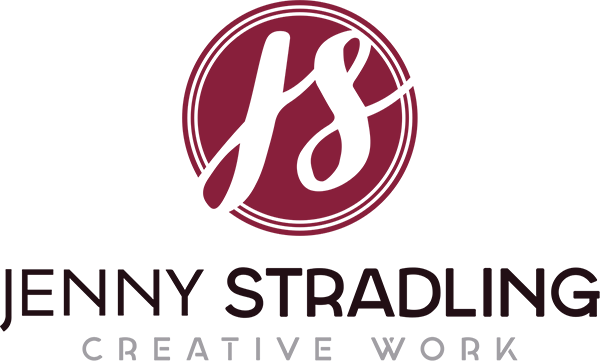
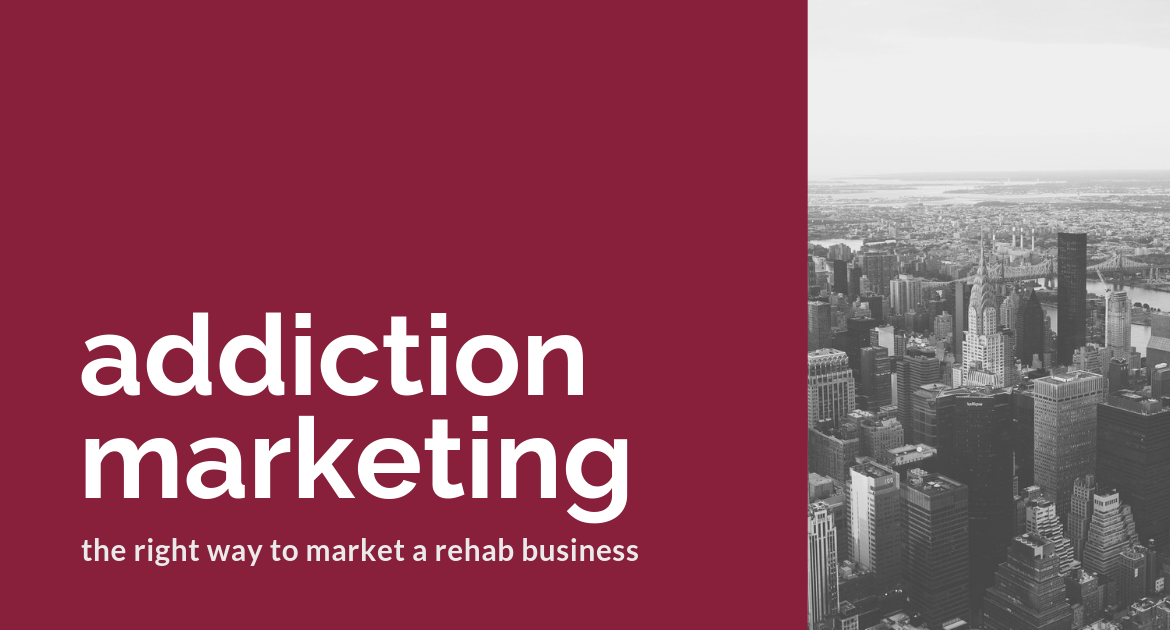
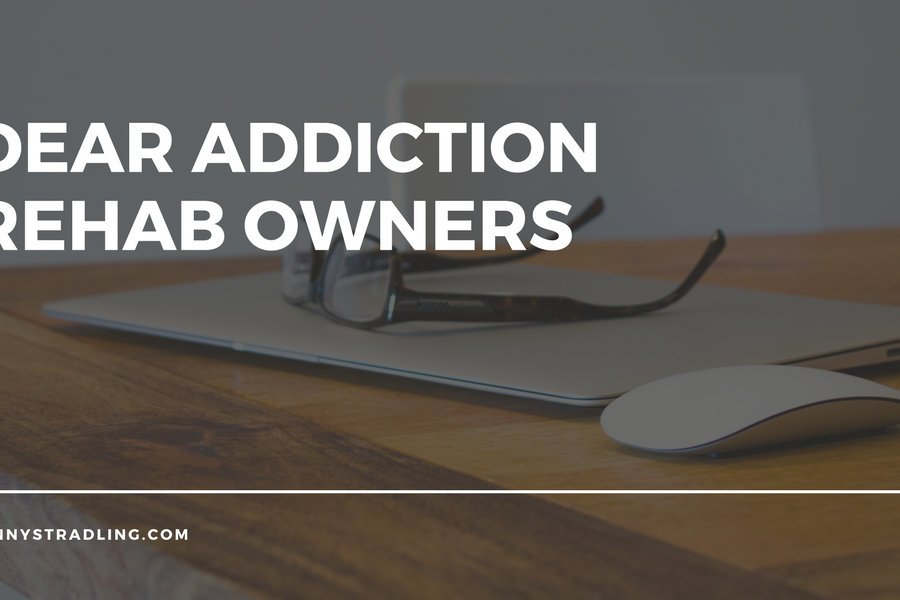
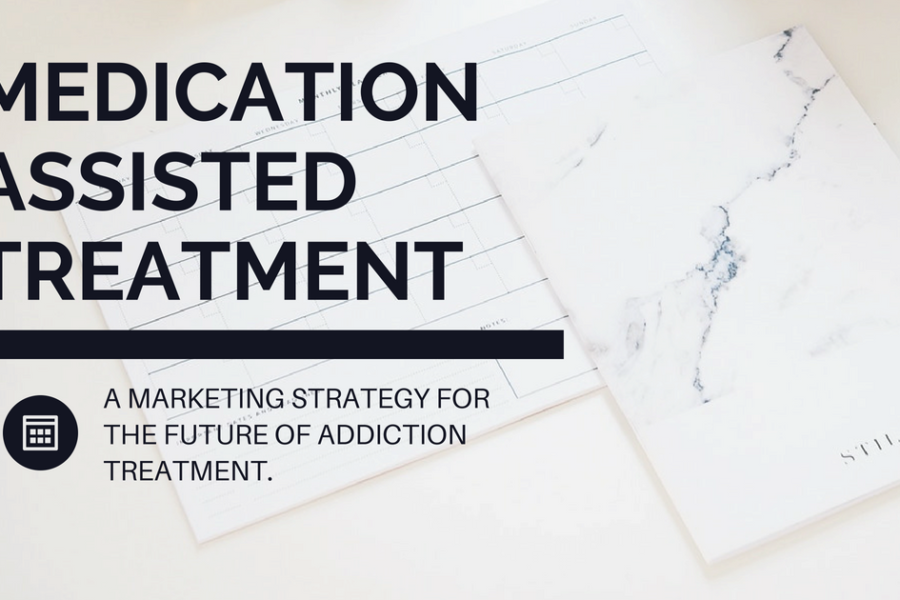
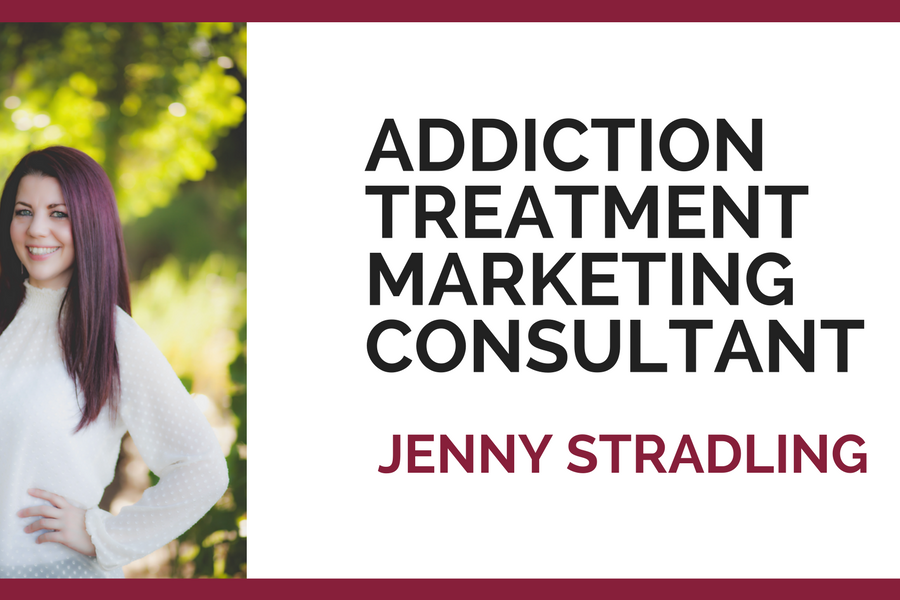
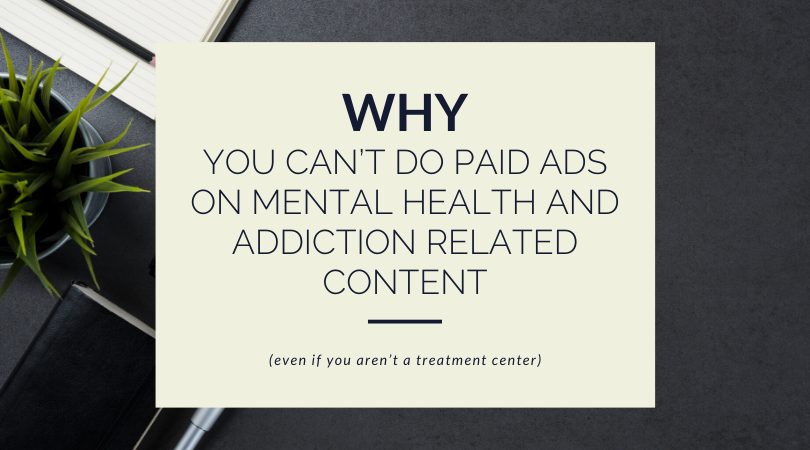

Leave a Reply